RUSH: The Republican health care plan, the repeal, replace, smack down of Obamacare, whatever it is, it is hinging on the entire procedure, methodology, policy, how we’re gonna deal with insuring people with preexisting conditions. And I’m gonna explain what all’s going on in the monologue segment of the next hour. But I want to say something before we get there, and it illustrates that we’re not really talking about insurance here.
When you get down to it, we’re told that the argument here is about health insurance and the costs, the deductibles and the premiums and the copays, but that’s not it. Health care long ago ceased to have anything to do with insurance. And when you’re talking about preexisting conditions, we’re not talking insurance.
 If you know what insurance is, I mean what the business plan, the model, if you know what the definition of the insurance business is, if you know that, then you would know automatically and instinctively that people with preexisting conditions cannot possibly be insured. In a real world, it isn’t possible. That makes insurance essentially welfare.
If you know what insurance is, I mean what the business plan, the model, if you know what the definition of the insurance business is, if you know that, then you would know automatically and instinctively that people with preexisting conditions cannot possibly be insured. In a real world, it isn’t possible. That makes insurance essentially welfare.
You’ve heard the old argument that — and people understand this. This is a dirty little secret. People understand this. The health care in this country has slowly evolved to an entitlement program that nobody wants to admit is an entitlement program so we all fall for the idea that what we’re buying here is insurance. We’re not. We’re buying a welfare plan but having to pay a little bit for it. That’s called our insurance premium. But we’re not buying insurance. We’re buying into an entitlement. Once the government got involved in this, there’s no way we’re buying insurance.
If you have a house but you don’t have any insurance on it, A, you might be in violation of the law, you probably couldn’t get a mortgage. But let’s say that you’re a shifty guy and you’re able to buy a house with no homeowners insurance. And one day you’re on your way home and your home is on fire, you can see the smoke, you can see the flames before you get to the driveway.
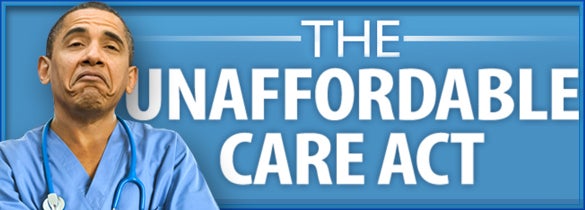 You pull in the driveway, oh, my God, the fire department’s not here yet, who do you call? Your insurance agent and ask for homeowners insurance? No, because you know why? Because you know you’d be laughed at. You know there’s no way you can buy insurance at that point. Nobody will sell it to you. It’s not the purpose of insurance. Insurance is insuring against the odds something’s gonna happen to you. It’s based on mathematics and actuarial tables, and it’s a real live business.
You pull in the driveway, oh, my God, the fire department’s not here yet, who do you call? Your insurance agent and ask for homeowners insurance? No, because you know why? Because you know you’d be laughed at. You know there’s no way you can buy insurance at that point. Nobody will sell it to you. It’s not the purpose of insurance. Insurance is insuring against the odds something’s gonna happen to you. It’s based on mathematics and actuarial tables, and it’s a real live business.
But it isn’t in health care. The minute you start tacking preexisting conditions on to what you’re going to call health insurance, you’ve just blown up the whole argument that what we’re talking about here is insurance, because you cannot — how many people do you know, if you think that I’m whistling Dixie here (no offense to Dixie), how many people do you know who have driven home and they’ve seen their house on fire and called an insurance company?
You don’t know anybody because nobody’s ever done it because everybody knows they couldn’t get it. There’s no way. The same thing with an automobile. I know the law says you have to have it, but how many people do you have an accident with that don’t have insurance? It happens more frequently than the law says should. So you have an accident, you don’t have any auto insurance, you gonna call somebody, “Hey, I just totaled my car, I need insurance.”
“Oh, really, what kind of policy do you have?”
“Well, I want you to give me a new car.” Ha-ha, they’ll laugh you off — you’re not so stupid that you even make that call. But when we’re talking health, preexisting conditions represent maybe 4% of the population that we’re talking about. So any health care, I don’t care if it’s Obamacare, Trumpcare, Ryan, whatever, it’s being held up basically here on the preexisting condition side for 4% statistically of the population.
But here’s why it works, Jimmy Kimmel notwithstanding. Preexisting conditions, people that have preexisting conditions are really sick. They are not waiting to get sick, they are. Other people buying, quote, unquote, insurance are not sick yet, but the law says they have to have it or they want to have it because it’s so expensive they go broke, blah, blah, blah, and with Obamacare a lot of people are. So when the really sick are told they can’t get health care under current health care, everybody, “That’s not fair! It isn’t right!”
 ‘Cause people with preexisting conditions really are sick. People ask, “Why can’t they get covered? Why can’t they be taken care of?” Well, they will be. They always have been. In fact, in Obamacare, the high risk pools that were designed to create the revenue to care for people with preexisting conditions, you know what happened? Nobody enrolled in ’em! That’s why there wasn’t any money in ’em.
‘Cause people with preexisting conditions really are sick. People ask, “Why can’t they get covered? Why can’t they be taken care of?” Well, they will be. They always have been. In fact, in Obamacare, the high risk pools that were designed to create the revenue to care for people with preexisting conditions, you know what happened? Nobody enrolled in ’em! That’s why there wasn’t any money in ’em.
So, anyway, preexisting conditions are what is the, not the final, but it’s the biggest clog in the Republican effort to come up here with a repeal and replacement bill. And I will explain what the plans are, what the proposals are, what the procedures are as we get into the next hour. But I don’t want anybody getting mad at me here. My contention is that we have all been lulled into, over the years, like the frog in the pot of water on the stove and the heat’s not on and gradually one year they turned the heat up a little bit more, “Hey, that actually feels good.” Turn the heat up a little bit more, by the time you realize you’re in trouble, it’s too late.
And that’s what the encroachment of government-run health care has been. And the fact is, with the government now involved in so much of it, we’re not even talking insurance. It’s just a welfare plan where we have agreed to pay a little bit into it in order to access it, and we call those payments our premiums. If you doubt me, who’s running this show? Who’s running health care? Who sets the rules? Who tells you whether you can or can’t get covered? Who tells you what it costs? I’ll give you a hint: They don’t live and work in the markets.
BREAK TRANSCRIPT
RUSH: Now, I want to explain what insurance is. I’m not trying to make a big deal about this. I’m just trying to make sure that everybody understands what we’re talking about when we talk about health care and health insurance in America, because we’re really not the talking about health insurance. And we haven’t been talking… Well, I take it back. That’s what we’re talking about, but that’s not what we have.
This whole business of government being involved in health care, you can trace it back to the sixties with Medicare and Medicaid. You go back to the sixties and you can find Democrat politicians salivating over their dreams of what the health care system could become, and it’s basically become that. More and more government involvement. ‘Cause it offers you so much opportunity to control people in practically every aspect of their lives. If you hold the keys to their wellness — if you can succeed in driving the cost of wellness — past the point people can afford it and you’re the only place they can go to get treated for sick, then they own you, or you will own them.
And for people that want to own people — by that I mean for people who want as many people dependent on them as possible — then doing to the health care system of this country what has been done is one of the best ways to make that possible. But the business model of insurance bears no resemblance to what health care insurance is in America today. In the real world, if you go talk to people that are passionate about insurance… I know that insurance is a subject that most people look at as a necessary evil, and they certainly can’t understand people being passionate about it.
 But the people who are will tell you that it’s one of the greatest inventions, genius inventions of humanity of all time because by design, for a small premium — i.e., payment — a person can be protected against calamities that could wipe them out. Insurance is needed because the cost of a calamity that wipes you out is much greater than any average person is ever going to be able to afford. And insurance, depending the company, you can buy insurance for whatever you want, if somebody will run the numbers and create a policy for you. That’s why there’s Lloyd’s of London.
But the people who are will tell you that it’s one of the greatest inventions, genius inventions of humanity of all time because by design, for a small premium — i.e., payment — a person can be protected against calamities that could wipe them out. Insurance is needed because the cost of a calamity that wipes you out is much greater than any average person is ever going to be able to afford. And insurance, depending the company, you can buy insurance for whatever you want, if somebody will run the numbers and create a policy for you. That’s why there’s Lloyd’s of London.
That’s why there are any number of insurance companies that are off the wall and way out there and not part of a big nationwide brand name. But for just a small premium or relatively small premium you can be protected against calamities that could wipe you out, whether it’s massive health issues or your house burning down, disability, unable to work and therefore produce an income. It’s helped a lot of people over the years. And it is a valid business model when it is done honestly and sincerely. But the people that are gonna take on this responsibility…
If you’re gonna become an insurance company, if you’re gonna be the person that sells these premiums to people, you had better be able to pay off. If you can’t pay off, then you’ve got hell to pay. So insurance companies, the people that sell these relatively small premiums that insure people — you’re buying against the odds. When you give the insurance company money, you hope that what your insuring against never happens. If it does, the insurance company had better be able to pay off.
They had better have access, not just to the money you paid them, but all their other policyholders, and they had better have invested all of that money so that their pool grows and grows and grows to be able to handle any and all claims that come their way. They’re hoping nothing happens to you. They’re hoping that they never have to pay you off. They’re hoping that the only relationship they have with you is you paying them. But they always are gonna have to pay off. A tornado goes through town.
When I was young, when I was growing up — I mean, very young — a tornado ripped through our little town, Cape Girardeau, Missouri. My parents told me that the first people on the scene were the insurance companies paying off. It was a PR opportunity like no other. Be the first in the town. When people finally were able to go back and look at the destruction, the first people they saw were insurance agents willing to help them right then and there. It worked.
But they require a mathematical certainty, and if the certainties are ignored, then the insurance falls apart, and it’s not there. Now, the principle of insurance is to collect these premiums from a lot of people. You go out and you sell policies to as many people as you can, where the trends and the actualities of loss can be calculated. So that’s what the actuarial tables are. For example, if you’re in the business of selling health insurance, let’s say.
You are gonna find out some hard, cold facts. You’re gonna get some stats. Okay, you sell a policy to a thousand people. What’s gonna happen? What’s gonna happen to those thousand people? Well, you can’t predict it. All you can do is study averages, occurrences, and create likelihoods. So if they end up knowing — quote, “calculating” — that for every 1,000 people, 380 are so are going to get cancer, then that’s step one in pricing the premium that they sell you.
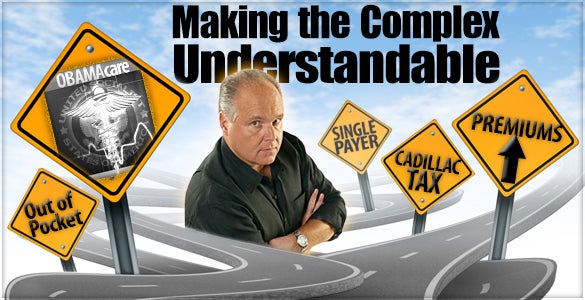 By knowing these numbers, they can put together a business model that serves the purpose of insuring all 1,000 people while realizing a profit on the investment of those premiums that will pay off the 380 people they expect to come calling because they have contracted cancer or whatever disease is being insured against. But none of this works, and the business model falls apart, if you throw preexisting conditions into this. If all 1,000 people coming to you buy insurance already have cancer, what in the world are you doing — you can’t. You wouldn’t. You would not sell them insurance. You would have to send them someplace else.
By knowing these numbers, they can put together a business model that serves the purpose of insuring all 1,000 people while realizing a profit on the investment of those premiums that will pay off the 380 people they expect to come calling because they have contracted cancer or whatever disease is being insured against. But none of this works, and the business model falls apart, if you throw preexisting conditions into this. If all 1,000 people coming to you buy insurance already have cancer, what in the world are you doing — you can’t. You wouldn’t. You would not sell them insurance. You would have to send them someplace else.
That’s not what you do. You’re selling people an opportunity to be made whole if something happens, not after it has happened. Insurance is not what you do if you’re selling policies to people who are already sick. You wouldn’t do it because that’s not the business you’re in. So who does pay for people who are already sick, who can’t buy insurance because of it because it makes no sense to sell it to them. In the real world, that’s a dumb thing to do, to sell insurance to people that already are sick.
So what are we as a society gonna do in that circumstance? Because the fact of the matter is, the vast majority of those people with preexisting conditions are not gonna be able to afford it themselves. So what do they do? Where do they go? Well, what we’re trying to do is include that group of people in a system that we’re calling health insurance. I’m sorry, folks. It breaks down, the numbers don’t work, the business model falls apart, and we’re not talking insurance anymore.
And when you’re going to use the money raised by the premiums of the healthy to cover those with preexisting conditions, you’re gonna have to charge them more than you would if you weren’t covering preexisting conditions. So everybody’s premiums are gonna go way up beyond what they would be if we’re going to call this insurance. And we damn well are gonna call it insurance ’cause we’re not gonna call it what it really is. Because if we called it what it really is, we wouldn’t have nearly the massive support for it that we do. I mean, people wanting government to take care of them.
If, for example, the coverage of people with preexisting conditions was called an entitlement or welfare, it would change entirely the way people look at it, and it would change attitudes, not for the better. But as long as we can convince people that all we’re talking about here is insurance, then that makes it fine. The health care system in this country blew past the insurance model decades ago. Nobody’s selling health insurance.
Even when you had employment-based coverage, the employer was supposedly paying your premiums up to certain point, you paid this, they paid that, whatever. It was a benefit. It wasn’t an insurance plan. And when Harris Wofford came along in 19 whenever it was, sometime in the late eighties, early nineties, Senator from Pennsylvania, and declared that it was now Democrat Party policy that if the Constitution of the United States is going to guarantee you a lawyer when you can’t afford one, then by golly, by gosh, it ought to assure you a doctor and a nurse and a hospital when you can’t afford one.
And the masses said, “Yes, exactly right! It’s our right to be well, it’s our entitlement to be well, and to have provided for us whatever is needed for us to be well.” And Big Government architects were only too happy to comply. And when Big Government architects got involved, the game ended because that’s when prices for everything began to skyrocket because the people buying the service were not the ones paying for it, therefore prices were not based at all on market-based forces.
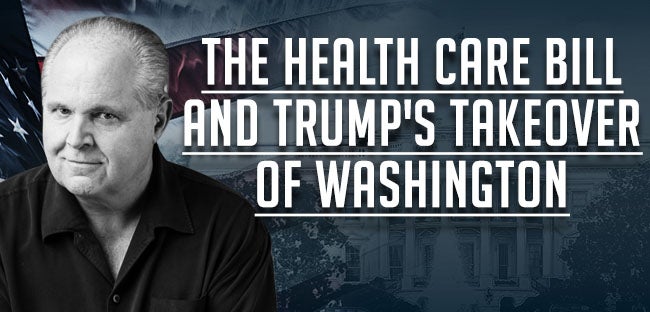 Health care prices decades ago ceased being about what most people could afford. That has not happened in other industries. Hotel industry, there are as many different hotels as there are people willing to pay what for them. Airline tickets, you name it, cars, TV sets, houses, they’re available in every price range based on people’s ability to pay. In health care, no relationship whatsoever to what people can afford. Prices are nowhere near what people can afford. Prices are the most that they can get an insurer or the government to repay them for.
Health care prices decades ago ceased being about what most people could afford. That has not happened in other industries. Hotel industry, there are as many different hotels as there are people willing to pay what for them. Airline tickets, you name it, cars, TV sets, houses, they’re available in every price range based on people’s ability to pay. In health care, no relationship whatsoever to what people can afford. Prices are nowhere near what people can afford. Prices are the most that they can get an insurer or the government to repay them for.
When you have third-party payers once or twice removed from the actual patient, customer, then long gone is any market pressure on prices. That’s where we are in our health care system, but yet we still call it what it isn’t. We call it insurance, we call it this, because it’s easier to sell it to people as insurance. When what it really has become is its own entitlement program or welfare program that you have to pay a little bit for.
Kind of like Social Security. Yeah, but you have to pay for it, theoretically. And that makes it all okay. “It’s not welfare. I have to buy a policy. I’m paying for a policy.” Yeah. A policy that’s now so out of whack you can’t even afford to use it, thanks to Obamacare. Premiums are skyrocketing, the deductible is such that you don’t want to use the policy yet you want to get covered because the government’s told you you have to have this. Now a matter of law, you have to have Obamacare insurance. If you don’t, you are in violation of the law.
And when you go out into the marketplace trying to buy it, there is nowhere you can go where the price makes any sense based on what you can afford. You can’t afford it unless there is a subsidy. And where does this subsidy come from? Well, other taxpayers, but most people think from the government, because the pricing here is not relevant to reality in any way, shape, manner, or form.
BREAK TRANSCRIPT
RUSH: In an answer to an emailer, my point about insurance and preexisting conditions, look at what we… I’m gonna try to describe attitudinally the way most Americans see this entire health care, health insurance, medical treatment array. It begins with the realization everybody has that they can’t afford it. They can’t even afford the basics anymore. The basics have gone way beyond most people’s ability to afford them. Just a checkup to the doctor — because the law requires all these tests now — you just can’t afford it.
 You go to the doctor, an emergency room — or you don’t need any treatment but they have to do $10,000 worth of tests. So everybody knows they can’t afford it. Ergo, they need somebody helping them out. What’s the objective? Most people think the objective is to make the sick better. Most people think that there is compassion behind the American health care system and that it is there to take sick people and make them well or to make them better, at least to give them treatment. Because we think that’s a right now.
You go to the doctor, an emergency room — or you don’t need any treatment but they have to do $10,000 worth of tests. So everybody knows they can’t afford it. Ergo, they need somebody helping them out. What’s the objective? Most people think the objective is to make the sick better. Most people think that there is compassion behind the American health care system and that it is there to take sick people and make them well or to make them better, at least to give them treatment. Because we think that’s a right now.
Enough people think that is a right. That has been one of the ways all of this has been sold, if you will, by the Democrat Party. So in the discussion of finding the most efficient ways of providing this access to people. Ergo, they get sick, they get to go get treated, it gets paid for, and they’re not destroyed in the process. Financially. Well, in the real world, the vast majority of people are not sick at any one moment in time. But at some point in their lives, they will be.
The younger you are, statistically, the healthier you are, and the less time you need to spend with doctors and nurses and medical appointments and all this. It was Obamacare which sought to soak these people, charging them exorbitant premiums, knowing full well they would never put any cost strain on the system ’cause they don’t get sick and they don’t get catastrophic illnesses in high percentages, compared to the elderly or older part of the population. But the point is this: The entire system…
As far as people are convinced, as far as they’ve been made to believe, the health care system is there to help people get well — and that we, as a society, have agreed that that’s what our health care system should do. The sick should be treated and get well. Now we move to those with preexisting conditions. By definition, those people are really sick. They are sick every day, all the time. And yet, what does our system say? “Well, sorry. We can’t insure you. We can’t insure you.”
 And people say, “What do you mean, you can’t? The purpose of our system is to make people well, and you’re telling me they can’t participate?”
And people say, “What do you mean, you can’t? The purpose of our system is to make people well, and you’re telling me they can’t participate?”
“Well, no, because it’s silly to insure people that are already sick, who may be terminal. It’s a losing proposition.”
“You SOBs! You heartless SOBs!”
You see where it breaks down? In a system that most people think is rooted in compassion and helping the sick get well, we tell this one group over here, “Sorry, we can’t treat you.” And those people happen to be the really sick. It doesn’t make sense. “Why can’t we sell ’em insurance, Mabel? Why don’t they want to?” “I don’t know, Nancy, but they tell me that that’s not really insurance.” “But why can’t they give them something? Those are really sick people!” And it breaks down.
Those people are 4% statistically here of the population. So we’re now tying ourselves in knots for a nationwide health care run — once again — by a bunch of wizards that know nothing about it. We’re trying to devise a health care system that accommodates 4% of the population first and that still provides insurance for everybody else. I’m sorry, it isn’t gonna work, because once you include people with preexisting conditions in an insurance program, you no longer have insurance.
And I’m not splitting hairs. It matters, because it matters in the way our government betters then come try to sell this. Why do you think that Obamacare created a mandate for you to buy this? Because they knew you wouldn’t! The way they were structuring this, they know nobody with common sense would pay what Obamacare costs are, so they’re gonna make it a matter of law for you to buy it. Obamacare made no effort to make this affordable. Obamacare made no effort to bring down costs or premiums.
Obamacare made no effort… Obamacare’s sole objective was to make as many people as possible think they were getting a freebie and then create — in those people — a nationwide demand for the program. So where are we today? Well, interesting story here. This is from the New York Times earlier today: “GOP Scrambles as a Crucial Voice Shuns the Latest Health Bill — With two days left before an 11-day recess and no vote scheduled, House Republican leaders worked on Tuesday to win votes one at a time for their latest bill to repeal [Obamacare].
“A failure … would be the third time that Speaker Paul D. Ryan…” Bad news, couldn’t rally his House members, blah, blah, blah. “Representative Fred Upton of Michigan was only the latest Republican defector, but [Upton] carries more sway than most.” Upton was a supporter. Upton early today, last night, pulled himself out; said he was a “no” vote on this. Does the name ring a bell, Fred Upton? (interruption) Well, it will when I tell you. Fred Upton led the charge in the House of Representatives to get rid of the incandescent lightbulb and replace it with these curlicue’d compact fluorescents.
 That’s who Fred Upton is. Therefore, because Fred Upton did something the left loved, now he has a lot of power. So when Fred Upton pulls out, the media says, “Oh, man, Ryan’s in trouble! Fred Upton! Oh, my God! Oh, my God!” Ever since Mr. Upton helped Obama lead the drive to do away with incandescent lightbulbs, he’s been a darling of the Drive-By Media and a crucial voice.
That’s who Fred Upton is. Therefore, because Fred Upton did something the left loved, now he has a lot of power. So when Fred Upton pulls out, the media says, “Oh, man, Ryan’s in trouble! Fred Upton! Oh, my God! Oh, my God!” Ever since Mr. Upton helped Obama lead the drive to do away with incandescent lightbulbs, he’s been a darling of the Drive-By Media and a crucial voice.
“Mr. Upton said the latest version of the health care bill ‘torpedoes’ protections for people with,” dadelut dadelut dadelut dadelut, “preexisting conditions.” Now we move to a story from CNN right before the program. Breaking news: “GOP representatives Fred Upton and Billy Long say they will now support the Republican plan to repeal and replace Obamacare after having met with President Trump this morning.”
So last night, darling of the left Fred Upton was opposed because the Republicans were gonna be mean to people with preexisting conditions. After having met with Trump, he’s now switched to a “yes” vote. The White House is in a full-court press to rally Republican support. They want to get this done again because of upcoming 11-day recess. They just had a 14-day recess. Got another 11-day recess coming up.
So next we return to Betsy McCaughey, who has a piece at InvestorsBusinessDaily.com in which she says that some Republicans are running scared. “Although the [latest Republican] bill solves two problems — lowering premiums and protecting people with pre-existing conditions — these fence sitters are worried about something else — getting re-elected. As a member of the New York delegation [said], the issue is ‘optics.'”
These Republicans are cowed. They are frightened. They are scared because of the false reports in the media that the GOP is abandoning people with preexisting conditions.
Let me ask you, in the news that you’ve consumed in the last 24 hours, have you seen the story reported on Obamacare and the latest repeal and replace effort? If you have, you no doubt have seen the media — CNN, New York Times — tell you that the Republicans want to torpedo people with preexisting conditions.
They don’t. There is a new plan to deal with preexisting conditions in this Republican bill, but the media is telling people the Republicans are gonna leave ’em out. And the Republicans on the fence know that the media is lying, but they are conceding the media has more power with their voters than reality does.
So the people trying to sell these Republicans are trying to essentially say, “Would you maybe side with us on what we’re really gonna do here instead of what the media says we’re gonna do?”
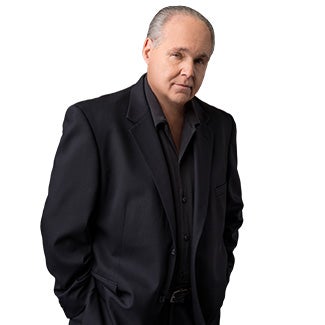 The truth is, nobody in this deal from the White House down to the House of Representatives wants to abandon people with preexisting conditions. This is along the lines of Republicans want to starve kids. This is along the lines of Republicans are gonna kick seniors out of their houses. Republicans are gonna take your Social Security away. It’s a common tactic the left uses, and now they’ve ramped it up: Republicans want to torpedo people with preexisting conditions. But no one wants to do that.
The truth is, nobody in this deal from the White House down to the House of Representatives wants to abandon people with preexisting conditions. This is along the lines of Republicans want to starve kids. This is along the lines of Republicans are gonna kick seniors out of their houses. Republicans are gonna take your Social Security away. It’s a common tactic the left uses, and now they’ve ramped it up: Republicans want to torpedo people with preexisting conditions. But no one wants to do that.
There is a consensus on the Republican staff here that people with preexisting conditions should be able to get something that we’re gonna call insurance. See, even Ms. McCaughey here calls it insurance. Whatever they end up with, it isn’t gonna be insurance. We’re bastardizing a term, and it matters. They’re gonna be covered, they’re gonna be able to pay, treatments are gonna be paid for. It isn’t insurance.
But as long as we call it insurance, everybody will be comfortable with it, because then we’re not being mean and we’re not denying insurance to the really sick. Even though we’re not talking insurance here. The issue is who pays. Wait a minute. If they’re gonna be part of the insurance pool, aren’t they gonna pay? No, because nobody will sell to them. Nobody’s gonna sell insurance to people already sick. It just isn’t gonna happen. They’re gonna have to be accommodated some other way.
What ought to really happen here is, the simplest way, is to take whatever the percent, 4% who have preexisting conditions and designate them as a special class who are going to have medical expenses covered by some funding mechanism that may be part of the overall bill or not, but don’t commingle these people with the genuine insurance that’s going on elsewhere. ‘Cause then we’re not talking insurance. And it does matter because that’s the way they’re able to convert this into a massive welfare bill while everybody thinks it’s insurance. It’s another sleight of hand.
So here’s how the Republican bill that they’re all debating now deals with preexisting conditions. Well, first, let me talk about Obamacare. Obamacare forced healthy people with the mandate in the individual market to the foot the entire bill. That’s what the exorbitant premiums charged to young people were going to pay for, preexisting conditions patients. That’s why your Obamacare premiums doubled, is because of preexisting conditions and because you’re no longer buying insurance for yourself or anybody else. This is why this is important.
 The new House bill sets up a $130 billion pot of money federally funded, I don’t quite know how, but it’s $130 billion federally funded to pay for people with preexisting conditions. The whole nation chips in, not just people stuck in the individual market. That’s the plan, essentially, is to segregate them out of the insurance market. We’ll still call ’em insurance. But keep preexisting conditions separate so that their inclusion doesn’t blow up the insurance business model pricing mechanism and everything else.
The new House bill sets up a $130 billion pot of money federally funded, I don’t quite know how, but it’s $130 billion federally funded to pay for people with preexisting conditions. The whole nation chips in, not just people stuck in the individual market. That’s the plan, essentially, is to segregate them out of the insurance market. We’ll still call ’em insurance. But keep preexisting conditions separate so that their inclusion doesn’t blow up the insurance business model pricing mechanism and everything else.
BREAK TRANSCRIPT
RUSH: You’ve all heard of Lloyds of London, right, the insurance people? They insure anything. You take a proposition and they’ll run the numbers on it, and they’ve insured a lot of boats. There’s one boat, one kind of ship they do not touch, they’ll never insure this particular kind of ship. You know what it is? Any ship that has already sunk and is on the bottom of some lake or ocean floor, Lloyds will not insure it. Isn’t it mean, it’s so unfair. How could they be so cruel to those particular boat owners.
Now, the Republican plan, the way this happens, the way this $130 billion pool to handle preexisting, they do it at the state level. States will be able to choose to get a waiver from the Obamacare community pricing rule. Not gonna bother telling you what that is. Just trust me here. Once the states get that waiver, that will mean insurers can start selling to healthy people at a far lower cost, ’cause they’re not gonna need to raise money to cover preexisting condition people.
That’s happening separately over there, and the states are gonna make this happen by exempting people from the Obamacare community pricing rule. States that get that waiver will see double-digit premium decreases for the healthy almost immediately. It was the community rating, or the community pricing in Obamacare, the single biggest reason premiums have doubled since 2013. And at the center of it is people with preexisting conditions.
I’m not meaning to pick on them. I’m trying to be very compassionate here. If you call it insurance, you blow whole system up for everybody everywhere else. If we as a nation are gonna pay for the sick to get healthy, then these preexisting condition people need to be at the top of the list. They’re the ones that are really sick, right now.
BREAK TRANSCRIPT
RUSH: Here’s Roger, Delray Beach, Florida. I’m glad you waited. Great to have you here, sir.
CALLER: Hello, Rush.
RUSH: Hey!
CALLER: How are you?
RUSH: Fine and dandy, sir. Thank you.
CALLER: Happy dittos to you.
RUSH: I appreciate that. (chuckles)
 CALLER: Well, it’s interesting. I was a real estate broker here in Florida, and I was also an insurance agent. I was an insurance agent in Connecticut, New York, North Carolina, and Florida. I’m just currently licensed here in Florida, but you’re right on. The only thing that I may add to what you’ve said about preexisting [conditions] is if you went to work for a large company like Microsoft or IBM or General Motors, after a 60- or 90-day period of time you’d be eligible for their group insurance.
CALLER: Well, it’s interesting. I was a real estate broker here in Florida, and I was also an insurance agent. I was an insurance agent in Connecticut, New York, North Carolina, and Florida. I’m just currently licensed here in Florida, but you’re right on. The only thing that I may add to what you’ve said about preexisting [conditions] is if you went to work for a large company like Microsoft or IBM or General Motors, after a 60- or 90-day period of time you’d be eligible for their group insurance.
You could have the need for a lung transplant or brain transplant and all these other things, and you’d still be able to get the insurance. Now, people wonder, “How can a group insurance company — or the insurer for that group — do this?” At the end of the year, they just look at the claims history for the past year and adjust the premiums up or down. Now, I don’t see that’s so difficult to figure out and why our government can’t do the same thing.
RUSH: ‘Cause they’re not doing that. The government’s not running an insurance plan. That’s my point. The government’s running a welfare system here.
CALLER: You’re right. I understand that.
RUSH: So the actuarial tables… They’ll use the actuarial tables as a means of justifying what subsidies are and what the premiums are, but it’s not based on insurance. These are people that are trying to create dependency.
CALLER: True.
RUSH: They’re trying to create a market where people have to turn to the government in order to stay well.
CALLER: Well, I know that because I’ve seen what Obamacare has done to the industry.
RUSH: Yeah.
CALLER: It’s just killed us. I have doctors that have left Medicare. They won’t take Medicare patients.
RUSH: Right, ’cause they don’t pay ’em!
CALLER: Yeah, exactly. But you know, we that were in the business, we knew this was a misrepresentation from the beginning because there’s no way that you can take a network plan and tell people you’re gonna be able to keep your doctor because the doctor may not be in the network.
RUSH: Exactly. And many of the doctors didn’t want to be in the network.
CALLER: Exactly. That’s true.
RUSH: Now, I gotta ask you something: You said brain transplant?
CALLER: Well, I said… (chuckling) If a person went to work for a very large company and they needed all of these treatments —
RUSH: But you were just joking about brain transplants.
CALLER: I was joking, yeah.
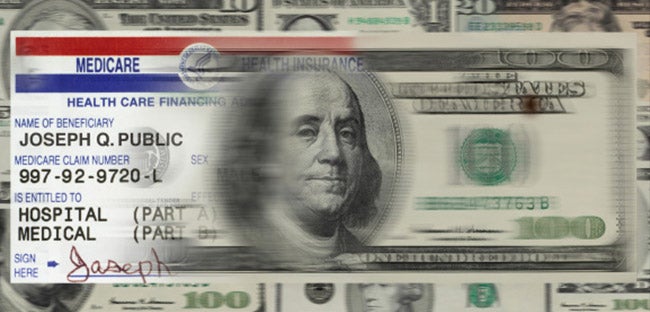 RUSH: Yeah, that would be somebody… If you transplant a brain, that would be the end of you.
RUSH: Yeah, that would be somebody… If you transplant a brain, that would be the end of you.
CALLER: Right. But the funny thing is that if you went to work for these large companies, you’d get insurance. If you went for United Technologies or IBM or whatever.
RUSH: Yeah, because it’s a large pool.
CALLER: Exactly. The claims reserves are set up and they’re controlled by the state. Now, it’s my understanding… By the way, originally I called in because I wanted to say that I think Trump is being Trump. He’s a very practical businessman, and he’s going to… In other words, as I told Snerdley, if he had a list of 20 things that he wanted, he might settle for 12 or 15 or whatever, and figure he’s got another shot at them on the next go round to come up with the other things. And I just think that he’s taking his pragmatic style of doing business to governing the country now, and trying not so much to work with Democrats per se but rather to figuring out —
RUSH: Look, you’re not the first to tell me this. We’ve got a lot of people in the construction business, other businesses that Trump’s been in who have said that this is the way he operates. That he’s not one big bite of the apple kind of guy, take as many bites as you need whenever you need them to get what you want done. And you’re not governed by a timeline but rather when is the best opportunity to move and do something. So we’ll see. I hope you’re right.
By the way, speaking of that, thanks, Roger.




